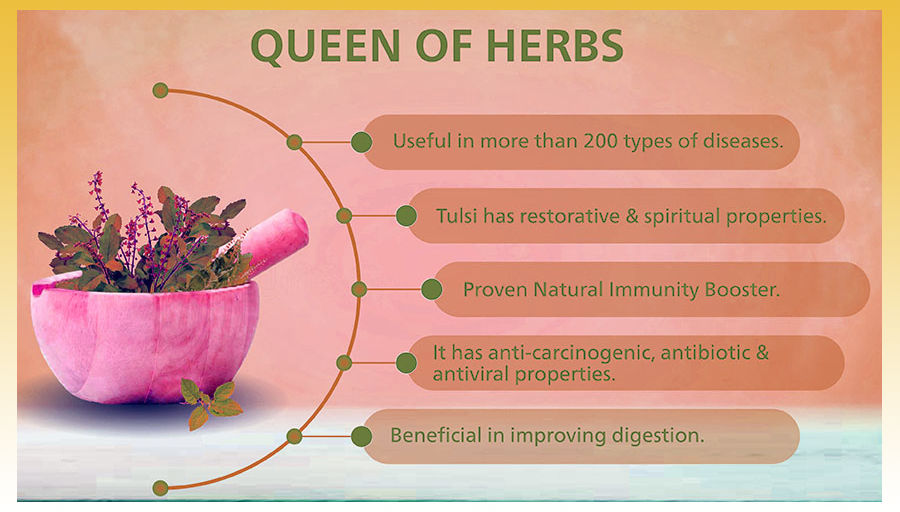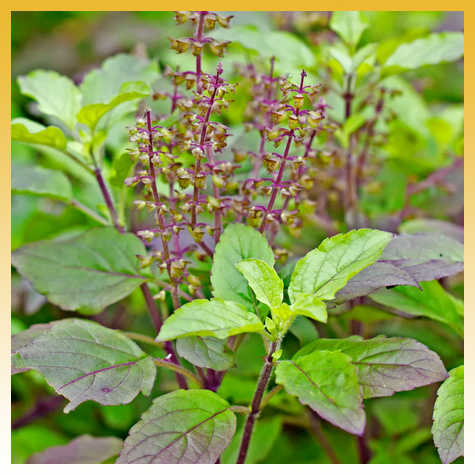Introduction
The Tulsi plant, also known as Holy Basil (“Ocimum sanctum”), holds a revered place in traditional medicine, particularly in Ayurveda, for its extraordinary healing properties. In addition Originating from India, Tulsi is considered a sacred plant and is often referred to as the “Queen of Herbs.” Moreover It is commonly grown in homes and temples and as a result has been celebrated for centuries for its ability to promote physical, mental, and spiritual well-being.
Main Types of Tulsi Plants
- Rama Tulsi – Ocimum Tenuiflorum – also known as Ocimum tenuiflorum in scientific name. It is the most famous kind of tulsi and is used for cooling effect in the body. It is good to drink rama tea or drops for better immunity, fight free radicals, skin problems and many more.
2. Krishna Tulsi – Ocimum Sanctum – It’s a purple tulsi that’s one of a kind. It is used for throat pain and infection, nasal problem, skin problem, ear-ache and the complete respiratory system.
3. Vana Tulsi – Ocimum Gratissimum – is a potent herb in Ayurvedic medicine, known as the “Forest Holy Basil.” Renowned for its antimicrobial, adaptogenic, and respiratory benefits, it strengthens immunity, reduces stress, and supports overall health and well-being.
4. Kapoor Tulsi – Ocimum Americanum – also known as “Camphor Basil,” is a fragrant variety of holy basil. Valued for its medicinal properties, it aids in respiratory health, boosts immunity, reduces stress, and acts as a natural insect repellent.
Herbal Values of Tulsi
1. Rich in Nutrients and Bioactive Compounds
Tulsi leaves are a powerhouse of nutrients, including vitamins A, C, and K, calcium, magnesium, potassium, and iron. The plant contains potent bioactive compounds like eugenol, ursolic acid, apigenin, and rosmarinic acid, which provide its numerous therapeutic benefits.
2. Adaptogenic Properties
As an adaptogen, Tulsi helps the body adapt to stress and restore balance. It reduces cortisol levels, enhances mental clarity, and combats fatigue, making it an effective herb for modern lifestyles.
3. Antioxidant and Anti-inflammatory Benefits
The antioxidants in Tulsi neutralize free radicals, reducing oxidative stress and inflammation in the body. This makes it beneficial for managing chronic diseases such as diabetes, arthritis, and cardiovascular conditions.
4. Immune System Booster
Tulsi is renowned for its ability to boost immunity. Its antimicrobial properties help fight bacteria, viruses, and fungi, while its adaptogenic qualities strengthen the body’s resistance to illnesses.
5. Respiratory Health Support
Tulsi is a common remedy for respiratory ailments such as coughs, colds, asthma, and bronchitis. It helps clear congestion, soothes the respiratory tract, and reduces inflammation in the airways.
6. Cardiovascular Benefits
Tulsi supports heart health by regulating blood pressure, lowering cholesterol levels, and reducing the risk of heart disease. Eugenol, a key component of Tulsi, is particularly effective in improving cardiovascular function.
7. Blood Sugar Regulation
Studies have shown that Tulsi helps lower blood sugar levels and improves insulin sensitivity, making it beneficial for managing diabetes.
8. Skin and Hair Health
Tulsi’s antimicrobial and anti-inflammatory properties make it an excellent herb for treating skin issues like acne, eczema, and rashes. It also promotes healthy hair by reducing dandruff and preventing scalp infections.
Home Remedies Using Tulsi

[metaslider id="265"]1. Tulsi Tea for Immunity Boost – GoTo Remedie
2. Tulsi Decoction for Cough and Cold – GoTo Remedie
3. Tulsi Face Pack for Clear Skin – GoTo Remedie
4. Tulsi Water for Detoxification – GoTo Remedie
5. Tulsi Oil for Hair and Scalp Health – GoTo Remedie
6. Tulsi Steam for Respiratory Relief – GoTo Remedie
7. Tulsi Juice for Digestive Health – GoTo Remedie
8. Tulsi Gargle for Oral Health – GoTo Remedie
9. Tulsi Memory Improver – GoTo Remedie
Spiritual and Cultural Significance of Tulsi
In addition to its medicinal properties, Tulsi holds immense spiritual value in Indian culture. It is often planted in homes and worshipped as a symbol of purity and protection. Many believe that Tulsi promotes positive energy, wards off negativity, and enhances spiritual growth.
Scientific Backing for Tulsi’s Benefits
Modern research supports many of Tulsi’s traditional uses:
Immunity: Studies confirm its role in enhancing immune responses and reducing infections.
Stress Reduction: Clinical trials show that Tulsi reduces cortisol levels and improves stress resilience.
Antioxidant Properties: Research highlights its ability to combat oxidative stress, reducing the risk of chronic diseases.
Blood Sugar Management: Tulsi has been shown to regulate blood glucose levels and improve insulin sensitivity.
Precautions and Side Effects
While Tulsi is generally safe, it is important to use it responsibly:
Pregnant and breastfeeding women should consult a healthcare provider before using Tulsi in medicinal quantities.
Excessive consumption may cause mild side effects such as nausea or low blood sugar in some individuals.
People on anticoagulant medications should be cautious due to Tulsi’s blood-thinning properties.
Conclusion
The Tulsi plant is a treasure trove of health benefits, offering a natural and holistic approach to well-being. Its versatility, from boosting immunity to enhancing skin health, makes it a valuable addition to daily life. By incorporating Tulsi into home remedies, one can harness its potent healing properties and promote a healthier, happier lifestyle. As both a medicinal herb and a spiritual symbol, Tulsi truly lives up to its reputation as the “Queen of Herbs.”
